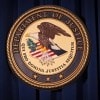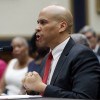Analysis | The Technology 202: Tech startup investors are skeptical of Washington’s increased antitrust scrutiny – The Washington Post

The Department of Justice logoREUTERS/Carlo Allegri/File Photo
Ctrl + N
Palo Alto, Calif. — Department of Justice officials traveled to the heart of Silicon Valley to listen to concerns about big technology from the smaller players.
But there’s no consensus among venture capitalists that the industry even has an antitrust problem —– and they’re skeptical intervention from Washington would be good for their businesses.
Several prominent tech investors wrote off some of the growing fears about large tech companies’ dominance — particularly the notion that “kill zones” exist around the tech giants in which smaller rivals cannot thrive.
Michael Moritz, a prominent venture capitalist known for investing in Google, Yahoo, and PayPal, pushed back on the theory that new company growth has been hampered because of worries that larger tech companies will try to quash emerging rivals by copying their products, or quickly buying them up before they can get big enough to become a competitive threat.
Moritz argued that city and state regulations are a much more significant threat to a start-up’s success than competition from larger rivals. He said a the workshop hosted yesterday at Stanford University that there are still opportunities for upstarts to challenge the large Silicon Valley incumbents, which he argued can be slow-moving because of their size.
“I don’t think today is any different from 20 or 30 years ago,” he said. “All of these companies are vulnerable in some fashion or another.”
Ram Shriram, an early investor in Google, said there continue to be areas where start-ups can take on the incumbents. “The way Big Tech will get disrupted is by new technologies like AI,” he said.
The workshop highlighted the wide chasm between the venture capital community and Washington, where concerns about the tech industry’s power are snowballing as lawmakers and government enforcers intensify their scrutiny of Silicon Valley. Major Democratic candidates running for president such as Sens. Bernie Sanders (I-Vt.) and Elizabeth Warren (D-Mass.) have also called for big companies like Facebook to be broken up.
Yet some big investors are content with the status quo — and they’re worried that any increased federal antitrust regulation could have unintended consequences.
“It’s a bit of a double-edged sword,” Patricia Nakache, a general partner at Trinity Ventures, told me in an interview at the event. “In a way, yes there are some potential bad behaviors that happen. These platforms don’t have a level playing field. But at the same time, there’s so much goodness in the ecosystem. They buy failing companies. Employees spin out of them and start their own companies. It’s a way more nuanced situation.”
Investors hope that lawmakers will consider these nuances as antitrust fever expands. In addition to DOJ’s review, the Federal Trade Commission also opened antitrust investigations into some large tech companies, including Facebook. The House antitrust subcommittee is conducting a broad review of Silicon Valley’s power. And state attorneys general have also opened their own probes into Facebook and Google’s power.
Venture capitalists are particularly concerned about any actions taken by regulators that could hamper larger tech companies’ acquisitions of start-ups — especially because those deals are often a key driver of returns for investors. Several expressed skepticism of the FTCs announcement this week it would review large tech companies’ mergers over the past decade — requesting documents even for deals that were not large enough to warrant deeper inspection at the time.
Nakache said the announcement was a “head-scratcher,” especially because many of the deals involved struggling companies that had few other options but to sell.
“I would certainly find it disturbing if the objective was to have close scrutiny over small acquisitions,” she said. “Because I feel like that is not where the problems are, in my view.”
The DOJ officials attending the event were actively seeking to create a channel of communication with start-up investors as they continue their months-long review into antitrust issues in Silicon Valley.
Makan Delrahim, the assistant attorney general for the DOJ antitrust division, opened the event by sharing an email address with investors where they could reach out with concerns or information that might be relevant, even under the condition of anonymity.
Manish Kumar, from the DOJ’s San Francisco office, sought to ensure investors that the department would enforce antitrust laws as “conscientiously” as possible.
“We will certainly be mindful of what was a refrain today of unintended consequences in the course of that,” he said.
BITS, NIBBLES AND BYTES

President Donald Trump smiles. (AP Photo/Evan Vucci)
BITS: Larry Ellison, the founder of database software company Oracle, is hosting a fundraiser for President Trump next week, Recode’s Theodore Schleifer reports. The event could draw new political scrutiny to the tech billionaire.
Ellison is expected to host Trump at his home in California’s Coachella Valley next week for a “Golf Outing and Reception,” according to an invitation obtained by the local newspaper, The Desert Sun. The paper reports that supporters can join a golf outing and have their photo taken with the president for $100,000. For $250,000, contributors get a photo, golf outing and can participate in a round-table discussion.
Oracle’s employees already pushed back against even less significant ties between the company and the administration.
“Ellison though has long been one of Silicon Valley’s most eccentric and independent-minded leaders, and so he might care little about the blowback,” Theodore writes.
Ellison is no longer Oracle’s chief executive but is its chief technology officer and executive chairman.

Sen. Cory Booker (D-N.J.). (Pablo Martinez Monsivais/AP)
NIBBLES: Sens. Jeff Merkley (D-Ore.) and Cory Booker (D-N.J.) introduced legislation yesterday to put a moratorium on all federal use of facial recognition technology until the government regulates it. The bill signals that growing bipartisan skepticism of the technology could drive regulation as early as this year.
“Facial recognition technology is both a powerful and a problematic new frontier,” Merkley said. “Before this unregulated market becomes too big to tame, Congress needs to put a moratorium on federal use of facial recognition while we develop responsible and ethical guidelines for its use going forward.”
The “Ethical Use of Facial Recognition Act” “would create a commission made up of law enforcement, privacy and technology experts and no fewer than seven members representing communities impacted negatively by the use of facial recognition technology. It would also bar state and local governments from using federal funding to purchase the technology.”
Merkley and Booker point to government research that shows a majority of facial recognition systems are less accurate when used on nonwhite individuals. Civil rights advocates who have called for a ban on the technology warn pervasive use will lead to discrimination and privacy violations.
The pair could find strong allies in the House, where House Oversight Chair Carolyn Maloney (D-N.Y.) and Rep. Jim Jordan (R-Ohio) are preparing to unveil similar legislation soon, they announced at a hearing last month.

A worker fixes a poster announcing the Mobile World Congress 2020. (Emilio Morenatti/AP)
BYTES: Organizers of one of the world’s biggest tech conferences yesterday canceled this year’s Mobile World Congress over fears of the coronavirus, my colleague Jeanne Whalen reported. The cancellation signals the growing shadow cast by the virus over the global tech industry.
“Global concern regarding the coronavirus outbreak, travel concern and other circumstances, make it impossible for the GSM [Association] to hold the event,” the telecommunications industry group that hosts the event said. The conference, which is hosted in Barcelona, normally gathers more than 100,000 guests from around the world, including the biggest names in technology and global telecommunications.
The short notice roiled attendees who had booked their travel to Barcelona:
But others saw it as an opportunity for an industry that loves to hype new means of communication like 5G. From the Verge’s Nilay Patel:
GSMA reportedly lobbied the Spanish government to enact emergency health measures that would have softened some of the financial penalties that organizations would suffer for canceling, Wired UK reports. GSMA, which already imposed restrictions on attendees from China, went ahead with cancellation without government intervention.
GSMA said it will continue to work with Barcelona on next year’s conference.
PUBLIC CLOUD
— News from the public sector:
California Introduces Law to Stop Delivery Apps Screwing Over Restaurants
The assembly bill is the latest silo in California’s war against Silicon Valley’s exploitative practices.
Vice
California Democratic congressman backs federal preemption of state privacy laws
A Democratic congressional representative from California today expressed support for federal preemption of state privacy laws and criticized his state’s first-in-the-nation privacy law, pitting himself against others in the state delegation who have strongly supported the California Consumer Privacy Act.
MLex
The FTC is cracking down on influencer marketing on YouTube, Instagram, and TikTok
The scrutiny is on companies and advertisers, not small influencers
The Verge
PRIVATE CLOUD
— News from the private sector:
Stood Up: Facebook Keeps Europe Waiting Over Dating Feature
The move came after the Irish Data Protection Commission raised issues with the feature’s compliance with European Union data protection rules.
Wall Street Journal
Facebook, Google ‘profit from doing customers harm,’ says Epic Games CEO Tim Sweeney
“Do we wanna be Las Vegas, or do we want to be worldwide, highly respected creators of entertainment products customers can trust?”
Gene Park
Andy Rubin’s Start-Up, Essential Products, Shuts Down
The smartphone company founded by Mr. Rubin, a former Google executive, struggled to win over customers.
The New York Times
As WhatsApp Tops 2 Billion Users, Its Boss Vows to Defend Encryption
WhatsApp has surpassed more than two billion active users, and its leader is vowing to defend its fully private form of messaging against mounting threats from governments around the world.
The Wall Street Journal
FAST FWD
— The startup Cultivate wants to boost tech talent in the liberal political movement beyond the boom-and-bust cycle of campaigns. Today the company launched a fellowship to train diverse tech workers to join organizations including Immigration Advocates Network, which uses digital tools to provide immigrants with legal support, and Motivote, a firm focused on increasing voter turnout.
Fellows will attend a boot camp to learn how digital tools work in an advocacy environment, said Sarah Stern, the founder of the Cultivate, which provides management coaching software.
“Understanding the user and understanding what a volunteer or organizer’s experience looks like day-to-day is really different” from what most technologists are used to, Stern told our researcher Tonya Riley. She says fellows will be trained on privacy and cybersecurity challenges they might not consider in corporate tech jobs.
Fellowship partners like IAN already have tech-focused employees on staff, but the program could help them attract more talent in a niche market — especially as they confront greater technical challenges.
“It brings in the sensitivity to privacy and security,” said IAN director Rodrigo Camarena. “We strive for accessibility and oftentimes our tools run on phones or systems that aren’t very advanced or don’t have a lot of data capacity.”
–Fight for the Future and a coalition of more than 40 leading consumer, privacy, and civil liberties organizations released a letter today urging administrators to keep facial recognition technology off of college and university campuses. The signers include the ACLU, FreedomWorks, National Center for Transgender Equality, Liberty Coalition, Electronic Frontier Foundation, Color of Change, Jewish Voice for Peace, Jobs with Justice, Consumer Federation of America, Mijente, Campaign for a Commercial Free Childhood and the National Immigration Law Center.
Kickstarter Hired a Law Firm That Advertises ‘Maintaining a Union-Free Workplace’
In the midst of a union drive, Kickstarter is working with a law firm that has previously helped clients avoid unionization, but the company says ‘union avoidance’ has never been its goal.
Vice
#TRENDING
— Tech news generating buzz around the Web:
The users who reappear after countless left swipes have become modern urban legends.
The Atlantic
Cost Cutting Algorithms Are Making Your Job Search a Living Hell
More companies are using automated job screening systems to vet candidates, forcing jobseekers to learn new and absurd tricks to have their résumés seen by a human.
Vice
Jeff Bezos Buys David Geffen’s Los Angeles Mansion for a Record $165 Million
The media mogul bought the Beverly Hills property, which was built in the 1930s for Jack Warner, for $47.5 million in 1990.
The Wall Street Journal
@MENTIONS
- Jessica Rich, the former Director of the FTC’s Bureau of Consumer Protection, is joining Georgetown Law’s Institute for Technology Law & Policy as a Distinguished Fellow, according to a news release.
- Adam Sussman, former chief digital officer at Nike, is now President of Epic Games, he announced on LinkedIn.
CHECK-INS
— Coming up:
- The Department of Justice will hold a public workshop in Washington, D.C. on Feb. 19, 2020, titled “Section 230 – Nurturing Innovation or Fostering Unaccountability”
- The House Communications and Technology Subcommittee will hold a field hearing on Thursday, February 20, at 2 pm at the Prince George County Central Wellness Center on the importance of rural broadband access.

















